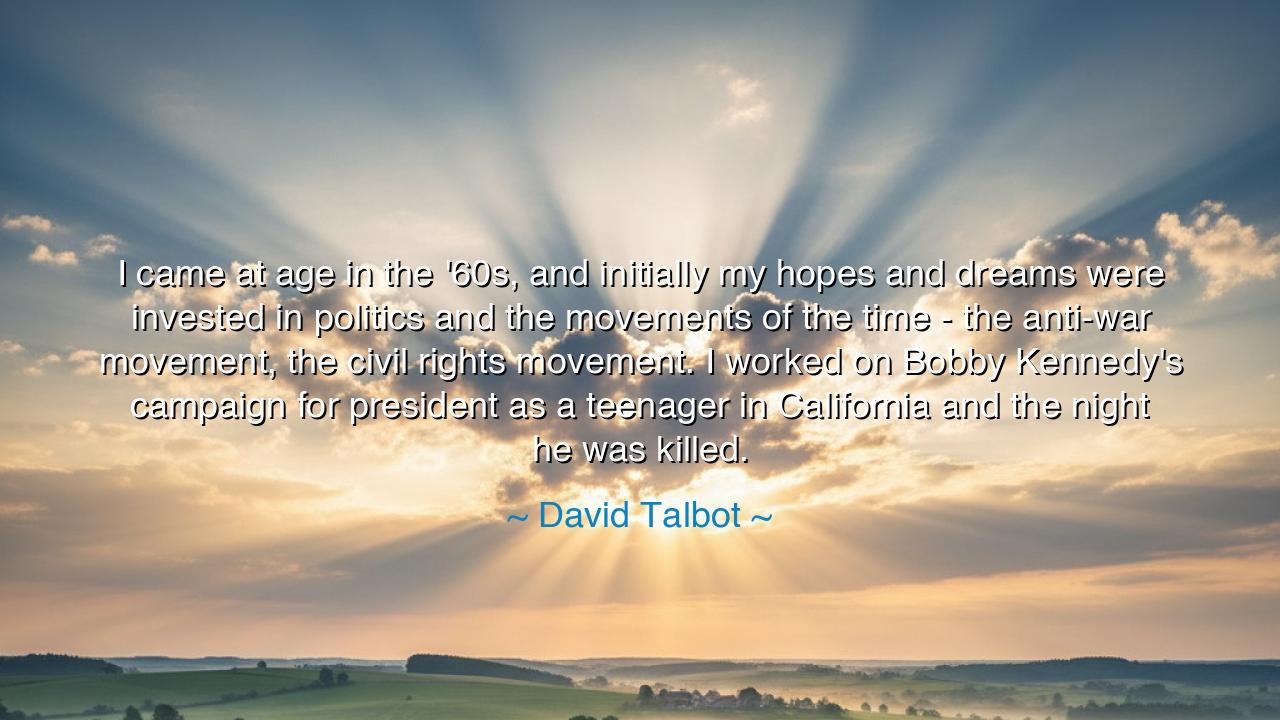
I came at age in the '60s, and initially my hopes and dreams were
I came at age in the '60s, and initially my hopes and dreams were invested in politics and the movements of the time - the anti-war movement, the civil rights movement. I worked on Bobby Kennedy's campaign for president as a teenager in California and the night he was killed.






“I came at age in the '60s, and initially my hopes and dreams were invested in politics and the movements of the time — the anti-war movement, the civil rights movement. I worked on Bobby Kennedy's campaign for president as a teenager in California and the night he was killed.” Thus speaks David Talbot, a witness to one of the most turbulent and transformative eras in modern history. His words carry the weight of a generation that saw the rise and fall of great ideals—the dawn of hope and the twilight of innocence. To understand his reflection is to understand the journey of a soul that believed deeply in the power of change, only to be tested by the tragedy of disillusionment.
In the 1960s, the world was ablaze with youthful fire. The air was thick with protest songs and banners that spoke of peace, freedom, and equality. The young believed that the old order could be overturned, that justice could be made visible, that the dream of brotherhood could become real. The anti-war movement rose like a wave against the darkness of Vietnam; the civil rights movement marched with the spirit of prophets, led by voices that echoed the cry for dignity. To come of age in such a time was to believe that the world could be remade by conviction alone.
Among those who stood as beacons of this dream was Robert F. Kennedy, the brother of a fallen president and a man of fierce compassion. To many, he embodied the fusion of political courage and moral clarity. When Talbot, still a boy, joined his campaign, he joined not merely a political effort but a spiritual cause—the belief that justice could walk again in the halls of power. Kennedy’s words stirred hearts: “Some men see things as they are and say, why? I dream things that never were and say, why not?” In those words, the youth of the era heard the call to build a new world.
But then came the night of sorrow. On June 5, 1968, in the kitchen of the Ambassador Hotel, Bobby Kennedy was struck down, and with him, a great part of the nation’s idealism. The torch that had been passed to the young flickered in grief. Talbot’s words, spoken decades later, recall not only the loss of a man but the collapse of a vision—the moment when hope met mortality. For those who lived it, the 1960s were not merely history but a sacred trial: a revelation that even the brightest flame can be extinguished by the cruelty of fate.
Yet from that grief, a deeper wisdom was born. Talbot’s reflection teaches that movements and ideals, though wounded, do not die when men fall. They are carried onward by memory, by the unseen work of those who refuse to let despair rule the soul. The tragedy of Kennedy’s death became, for many, a crucible—a test of whether faith in humanity could endure after innocence was lost. In this, Talbot’s remembrance is not one of defeat, but of enduring courage. The dream did not perish; it changed form, moving from the streets into the conscience of generations yet unborn.
Consider the ancient tale of Prometheus, who stole fire from the gods and suffered for it. His torment was endless, yet so was his gift. The fire he brought lit the path of civilization itself. So too was the fire of the 1960s—a gift bought at great pain, yet one that continues to illuminate. Every act of compassion, every protest for justice, every voice raised against tyranny carries a spark of that same flame. Though the dreamers fell, the dream itself became immortal.
Thus, my children of the present age, take heed. When you labor for truth, expect the night to come, as it did for Talbot and his generation. But do not let the night claim your heart. The hopes and dreams of those who came before you are not relics; they are seeds. You are the soil in which they must grow again. Learn from the past—not only its triumphs, but its heartbreaks—and understand that every movement of the spirit demands sacrifice. Let your conviction burn steady, not only in the light of victory, but in the long patience of perseverance. For in the end, the lesson of David Talbot’s words is eternal: that though the dreamer may fall, the dream of a better world—born of courage, grief, and grace—can never truly die.






AAdministratorAdministrator
Welcome, honored guests. Please leave a comment, we will respond soon